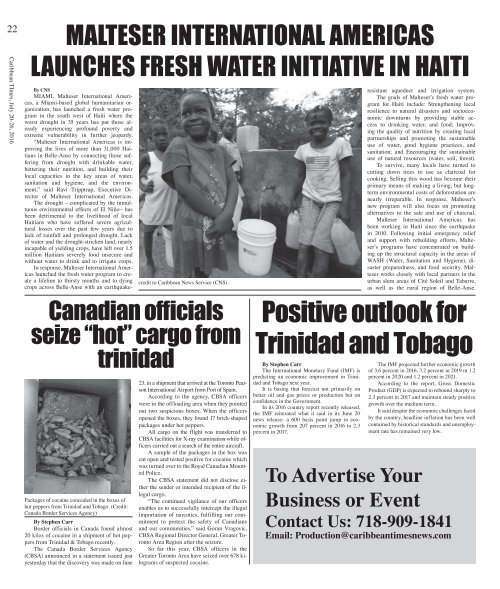Caribbean Times Newspaper 07.20.2016
Caribbean Times Newspaper A family-owned local newspaper located in New York City serving a vast growing Caribbean population living throughout the New York area. http://caribbeantimessite.com A bi-weekly newspapers and website that is working towards keeping the caribbean community informed about news and events as it relates to us right here in the USA as well as our respective first homes. http://caribbeantimessite.com
Caribbean Times Newspaper
A family-owned local newspaper located in New York City serving a vast growing Caribbean population living throughout the New York area.
http://caribbeantimessite.com
A bi-weekly newspapers and website that is working towards keeping the caribbean community informed about news and events as it relates to us right here in the USA as well as our respective first homes.
http://caribbeantimessite.com
Create successful ePaper yourself
Turn your PDF publications into a flip-book with our unique Google optimized e-Paper software.
22<br />
<strong>Caribbean</strong> TImes, July 20-26, 2016<br />
Malteser international americas<br />
launches fresh water initiative in haiti<br />
credit to <strong>Caribbean</strong> News Service (CNS).<br />
By CNS<br />
MIAMI, Malteser International Americas,<br />
a Miami-based global humanitarian organization,<br />
has launched a fresh water program<br />
in the south west of Haiti where the<br />
worst drought in 35 years has put those already<br />
experiencing profound poverty and<br />
extreme vulnerability in further jeopardy.<br />
“Malteser International Americas is improving<br />
the lives of more than 31,000 Haitians<br />
in Belle-Anse by connecting those suffering<br />
from drought with drinkable water,<br />
bettering their nutrition, and building their<br />
local capacities in the key areas of water,<br />
sanitation and hygiene, and the environment,”<br />
said Ravi Tripptrap, Executive Director<br />
of Malteser International Americas.<br />
The drought – complicated by the tumultuous<br />
environmental effects of El Niño– has<br />
been detrimental to the livelihood of local<br />
Haitians who have suffered severe agricultural<br />
losses over the past few years due to<br />
lack of rainfall and prolonged drought. Lack<br />
of water and the drought-stricken land, nearly<br />
incapable of yielding crops, have left over 1.5<br />
million Haitians severely food insecure and<br />
without water to drink and to irrigate crops.<br />
In response, Malteser International Americas<br />
launched the fresh water program to create<br />
a lifeline to thirsty mouths and to dying<br />
crops across Belle-Anse with an earthquakeresistant<br />
aqueduct and irrigation system.<br />
The goals of Malteser’s fresh water program<br />
for Haiti include: Strengthening local<br />
resilience to natural disasters and socioeconomic<br />
downturns by providing stable access<br />
to drinking water, and food; Improving<br />
the quality of nutrition by creating local<br />
partnerships and promoting the sustainable<br />
use of water, good hygiene practices, and<br />
sanitation; and Encouraging the sustainable<br />
use of natural resources (water, soil, forest).<br />
To survive, many locals have turned to<br />
cutting down trees to use as charcoal for<br />
cooking. Selling this wood has become their<br />
primary means of making a living, but longterm<br />
environmental costs of deforestation are<br />
nearly irreparable. In response, Malteser’s<br />
new program will also focus on promoting<br />
alternatives to the sale and use of charcoal.<br />
Malteser International Americas has<br />
been working in Haiti since the earthquake<br />
in 2010. Following initial emergency relief<br />
and support with rebuilding efforts, Malteser‘s<br />
programs have concentrated on building<br />
up the structural capacity in the areas of<br />
WASH (Water, Sanitation and Hygiene), disaster<br />
preparedness, and food security. Malteser<br />
works closely with local partners in the<br />
urban slum areas of Cité Soleil and Tabarre,<br />
as well as the rural region of Belle-Anse.<br />
Canadian officials<br />
seize “hot” cargo from<br />
trinidad<br />
Packages of cocaine concealed in the boxes of<br />
hot peppers from Trinidad and Tobago. (Credit:<br />
Canada Border Services Agency)<br />
By Stephen Carr<br />
Border officials in Canada found almost<br />
20 kilos of cocaine in a shipment of hot peppers<br />
from Trinidad & Tobago recently.<br />
The Canada Border Services Agency<br />
(CBSA) announced in a statement issued just<br />
yesterday that the discovery was made on June<br />
23, in a shipment that arrived at the Toronto Pearson<br />
International Airport from Port of Spain.<br />
According to the agency, CBSA officers<br />
were in the offloading area when they pointed<br />
out two suspicious boxes. When the officers<br />
opened the boxes, they found 17 brick-shaped<br />
packages under hot peppers.<br />
All cargo on the flight was transferred to<br />
CBSA facilities for X-ray examination while officers<br />
carried out a search of the entire aircraft.<br />
A sample of the packages in the box was<br />
cut open and tested positive for cocaine which<br />
was turned over to the Royal Canadian Mounted<br />
Police.<br />
The CBSA statement did not disclose either<br />
the sender or intended recipient of the illegal<br />
cargo.<br />
“The continued vigilance of our officers<br />
enables us to successfully intercept the illegal<br />
importation of narcotics, fulfilling our commitment<br />
to protect the safety of Canadians<br />
and our communities,” said Goran Vragovic,<br />
CBSA Regional Director General, Greater Toronto<br />
Area Region after the seizure.<br />
So far this year, CBSA officers in the<br />
Greater Toronto Area have seized over 678 kilograms<br />
of suspected cocaine.<br />
Positive outlook for<br />
Trinidad and Tobago<br />
By Stephen Carr<br />
The International Monetary Fund (IMF) is<br />
predicting an economic improvement in Trinidad<br />
and Tobago next year.<br />
It is basing that forecast not primarily on<br />
better oil and gas prices or production but on<br />
confidence in the Government.<br />
In its 2016 country report recently released,<br />
the IMF reiterated what it said in its June 20<br />
news release- a 600 basis point jump in economic<br />
growth from 207 percent in 2016 to 2.3<br />
percent in 2017.<br />
The IMF projected further economic growth<br />
of 3.6 percent in 2016, 3.2 percent in 2019 m 1.2<br />
percent in 2020 and 1.2 percent in 2021.<br />
According to the report, Gross Domestic<br />
Product (GDP) is expected to rebound sharply to<br />
2.3 percent in 2017 and maintain steady positive<br />
growth over the medium term.<br />
It said despite the economic challenges faced<br />
by the country, headline inflation has been well<br />
contained by historical standards and unemployment<br />
rate has remained very low.<br />
To Advertise Your<br />
Business or Event<br />
Contact Us: 718-909-1841<br />
Email: Production@caribbeantimesnews.com

















